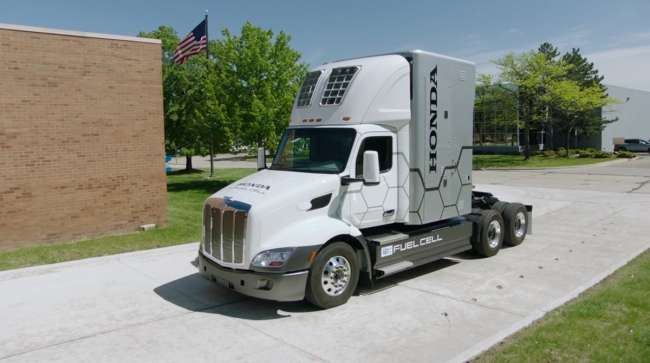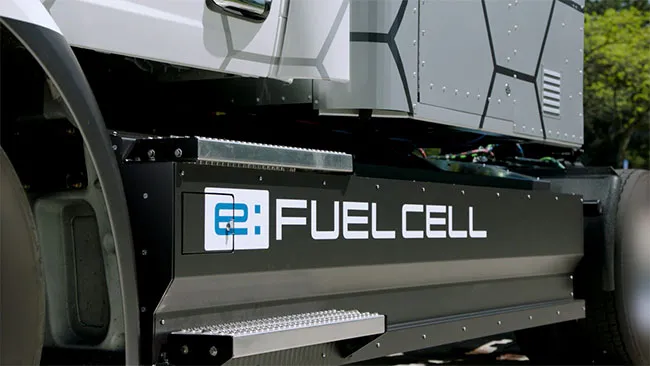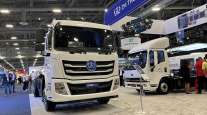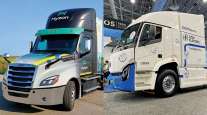Staff Reporter
Honda Takes Wraps Off Class 8 Hydrogen FCEV Concept Truck

[Stay on top of transportation news: Get TTNews in your inbox.]
LAS VEGAS — Honda Motor Co. unveiled a concept Class 8 hydrogen fuel cell electric truck during the Advanced Clean Transportation Expo, a public debut for a promised vehicle that points toward the company’s broader ambitions for the commercial truck segment.
The Japanese automaker revealed plans for the U.S. concept truck in January, and offered a sneak peek on May 17 before the truck’s official debut at ACT. The company already is testing a heavy-duty hydrogen FCEV in Japan alongside Isuzu Motors Ltd., a production model of which will be introduced in 2027, according to Honda.
A Peterbilt Model 579 tractor is the basis for the concept truck, which Honda retrofitted with its fuel cell systems. A spokeswoman said the concept truck is not a joint venture between the companies, and Honda does not currently intend to build Class 8 trucks. Its focus is on partnering with medium- and heavy-duty truck manufacturers, she said.
The North American concept truck has a gross combined weight (GCW) rating of just under 82,173 pounds (37,273 kilograms), with a tractor weight of 28,479 pounds (12,918 kg) and a trailer and payload weight of 53,694 pounds (24,355 kg), according to specifications released May 17.
#ACTexpo, the largest advanced commercial vehicle technology show, kicks off in Las Vegas next week. Explore the largest clean vehicle showcase & gain unparalleled insights into the trends, technologies & policies transforming commercial #transportation. https://t.co/PN1ZmWU9Ol pic.twitter.com/jwx0OnWMi6 — Advanced Clean Tech News / ACT Expo (@ACTExpo) May 14, 2024
Honda said the truck has a top speed of 70 mph and a range of 400 miles at peak GCW.
It comes equipped with a 240-kilowatt fuel cell system, an 82 kg, 700 bar hydrogen tank and a 120 kWh battery.
Serial production of the systems is underway at Fuel Cell System Manufacturing, a joint manufacturing venture with General Motors at a facility in Brownstown, Mich.
Production of the fuel cells for the commercial vehicle market began in January, the partners said. The plant is the culmination of a decade’s work, with the automotive giants first teaming up in 2013.
Honda expects the JV to pull in initial sales of 2,000 units per year and then expand output and sales progressively.
The JV is targeting annual production of 30,000 fuel cell systems by 2030, Ryan Harty, assistant vice president of sustainability and business development for American Honda Motor Co, told Transport Topics in an interview on the sidelines of ACT Expo.
The new fuel cell system is key to Honda’s hydrogen business strategy, announced in January.

Harty
“Commercial vehicles, including Class 8 trucks, where fuel cells offer the best zero-emission replacement for existing diesel applications, are a key part of Honda’s broad hydrogen business strategy,” said Harty. “Honda is actively seeking business collaborations and customers to help bring these hydrogen fuel cell solutions to market here in North America.”
At ACT Expo, Honda is showcasing the concept truck, a 2025 Honda CR-V e:FCEV sports utility vehicle, the fuel cell system itself and the Honda autonomous work vehicle, a prototype electric off-road vehicle.
Honda said it has identified four core destinations for the fuel cell system: FCEVs, commercial fuel cell vehicles, stationary power stations and construction machinery.
All are part of a Honda goal of zero environmental impact by 2050 with the “Triple Action to Zero” approach, which seeks carbon neutrality for all products and corporate activities, 100% utilization of renewable energy, and resource circulation, utilizing 100% sustainable materials by reprocessing products back to raw materials and reusing those materials in the creation of new products.

Production of the fuel cells for the commercial vehicle market began in January. (Honda Motor Co.)
As part of the goal, Honda wants 100% of its auto sales in the U.S. and globally to be battery-electric and fuel cell electric vehicles by 2040.
On May 16, the company unveiled a revamped battery-electric passenger car and light-truck strategy. The company said it plans to launch seven EVs globally by 2030 and intends to spend $65 billion over the next 10 years to aid its EV push.
David Perzynski, assistant manager of hydrogen carbon neutral solutions at American Honda Motor Co., told TT at ACT Expo the developments were driven by the parent company’s decarbonization goals. The fuel cell system could help decarbonize Honda’s own supply chain, he said.
Honda cannot do everything itself, so is looking for partners, including truck makers across the globe, said Perzynski, adding that the company has supplied internal combustion engines to OEMs in the past.
“Honda is happy to be open to OEMs to help their customers decarbonize,” added Harty.
Want more news? Listen to today's daily briefing below or go here for more info:




